
Emile Zola
(1840-1902)
French writer born in Paris in 1840 from an Italian engineer father and French mother. Self proclaimed leader of the French naturalism, his major series Les Rougon-Macquart is a panoramic account of the lives of 2 families during the Second French Empire. He was a major figure in the political liberalisation of France and in the exoneration of the falsely accused and convicted army officer Alfred Dreyfus, which is encapsulated in the renowned newspaper headline J'Accuse. He died in 1902 of carbon monoxide poisoning.
Other novels
Part of the Rougon-Macquart Saga:
-
-Le Curee
-
-La faute de l’Abbe Mouret
-
-Une page d’amour
-
-L’Oeuvre
-
-La terre
-
-La Bete humaine
-
-...
Others:
- Therese Raquin
- Madeleine Ferat
[Back cover translation] “This work, which will be made up of several episodes, is in my thoughts, the natural and social story of a family under the Second Empire. Thus, the first episode: The Rougon’s wealth, should bear its scientific title: The Origins.” We should add to these words by Zola, that this first instalment is one of the biggest masterpieces of a series which will count many. This is the story of the uprising of a nation against their oppressors, and already the description of a ‘Bloody week’ similar to the likes of the Commune, later mentioned in La Debacle. But it is also the song of love and death from two kids made for each other, betrayed by their parents, pursued by the fatalities of a damned race. Lastly, it is the build up for the prodigious Myth of Foundation, through which Zola pre-dated by more than half a century the visions of Freud or Rene Girard. A really brilliant book which anticipates astonishingly on the unfolding of the entire Rougon-Macquart cycle, because it already contains all the elements in its development.
La Fortune des Rougons was first published by Librairie Internationale Lacroix, Verbroeckhoven, 1871.

La Fortune des Rougons
Emile Zola









